News & Events in Belarus
Harvesting routine, international scuffle, CIS Olympics in agrarian and sport President’s Week
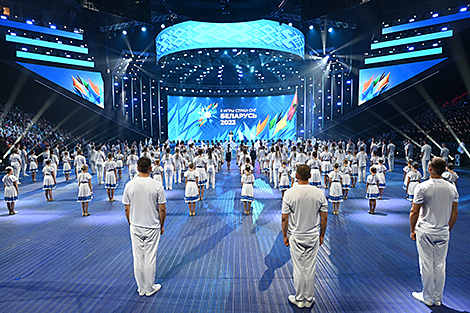
The work schedule of the Belarus president is always full of events. Aleksandr Lukashenko holds conferences and working meetings on the most topical matters concerning the country’s development, regularly visits the regions, goes on foreign trips and welcomes foreign guests, talks to reporters, signs decrees and laws. And even if there are no public events, it does not mean that the head of state does not work. It must be said that even when he relaxes, for instance, by playing ice hockey or chopping firewood, Aleksandr Lukashenko happens to find the time to give yet another instruction. All the decisions must be prompted by life, he likes to say.
The President’s Week project is intended for those, who want to keep up with the head of state, be up-to-date on the latest statements and decisions of the Belarusian leader.
Aleksandr Lukashenko went on a business trip to western regions of Belarus. What things deserve more attention in northern regions according to the president? Why did he want to shake up Belarusian scientists? Why does he insist on “human conditions” for cow calves? And who makes up the country’s foundation?
The key problem for Belarus, military threats, a contract army, the private military company Wagner, nuclear weapons, holders of the Pole’s cards, the impotence of the world establishment, and the long-awaited sport forum of the Commonwealth of Independent States. These and other matters are in the latest episode of BelTA’s special project President’s Week.
FIELDS UNDER THE WING. Why did Aleksandr Lukashenko fly to Belarus’ western regions and what did he see?
The head of state mentioned he intended to go to western regions of Belarus to check up on agriculture on Thursday, 27 July when he received a report from Deputy Prime Minister Leonid Zayats. As good as done. On Sunday, 30 July the president boarded a helicopter to inspect progress of the harvesting campaign in Minsk Oblast, Grodno Oblast, and Brest Oblast. Later that week he personally evaluated the situation in state-run agricultural enterprises in Brest Oblast and Grodno Oblast and “brought agrarians down to earth” on a number of matters of importance for the economy branch. It is worth noting that president did not go there to fight some fires. Brest Oblast and Grodno Oblast are in the lead as far as agribusiness is concerned. Needless to say that the agricultural enterprises Belovezhsky and Olekshitsy, which Aleksandr Lukashenko visited in Kamenets District and Berestovitsa District, are doing great.
These areas have a lot of good practices to share. They can be cited as an example of how the economy branch should be developed in other regions. Some special fertility of the soil or favorable weather is not the secret of the success. The key component is discipline and order, which the president demands from everyone tirelessly. It is necessary to till soil well, fertilize the crops, repair machines and vehicles, gather in the harvest without losses, preserve the harvest, process it and sell ready-made products. Roughly the same approach is encouraged in animal husbandry.
It seems the instructions are clear: take them and implement them. But not everyone has been successful at it despite regular financial infusions, all kinds of respites and installment plans offered by the state. Let us remind you that the former Agriculture and Food Minister Igor Brylo has been sent to Vitebsk Oblast, one of the most underperforming regions, to work there as a president’s aide. By the way, many instructions given by the head of state during the business trip across western parts of the country referred to Vitebsk Oblast.
As the president was told, overall harvest prospects across the country remain good for many crops despite fears during the drought period. However, corn and sugar beets are expected to yield better results than last year. Potato fields are also in good condition.
“Those who stick to technology do not encounter problems,” Deputy Agriculture and Food Minister Vladimir Grakun noted.
“If technology is not observed, planting does not make much sense. What is the purpose of sowing if crops yield 15-20 centners per hectare? In this case we spend more than we get,” the head of state emphasized. “If people work hard and comply with technology, they can count on our help.”
During working trips the head of state traditionally wanted to learn about problems instead of accomplishments. He wondered whether there were reasons for concern as far as the overall harvesting complex is concerned.
“All the issues have been solved with your help. I mean both fuel supplies and availability of harvesters,” Deputy Prime Minister Leonid Zayats replied.
“We need to reach 6% [of the area which needs to be harvested] a day. In this case we will get more or less desired results,” the president gave the instruction.
Tough requirement for northern areas
Aleksandr Lukashenko demanded to improve the situation in Vitebsk Oblast. It makes sense to plant more early crops there due to the region’s climatic conditions. Such crops include winter barley, rapeseed and a number of others. “This is my toughest demand - to sow early crops in the northern regions in order to start harvesting earlier. Let’s free up fields and sow winter crops earlier.”
The correctness of focusing on winter rapeseed and barley is proven by results of the work of agricultural enterprises in the south and in the west – in Brest Oblast.
Aleksandr Lukashenko had previously described winter rapeseed as “food, fodder and cash crop”. In other words, this is a raw material for rapeseed oil and animal feed, and a good export item. Winter barley has also earned a good reputation. The president pays close attention to this crop, he half-jokingly calls it “a political party crop”. “The yield was great last year. We will put more effort into it,” said Brest Oblast Governor Yuri Shuleiko.
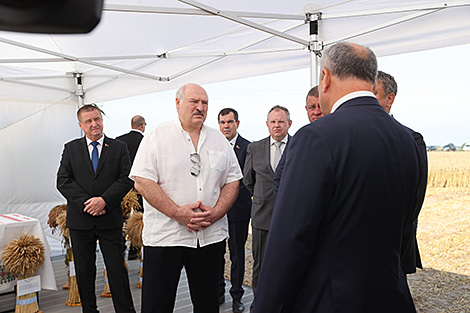
So this practice should be applied not only in northern regions but the country as a whole. The thing is this approach is vital for Belarus’ north considering the unpredictable weather and the shorter vegetation period.
“It is good that we had winter barley and rapeseed. We managed to harvest a fifth of them as of early August,” the head of state mentioned while in Berestovitsa District, Grodno Oblast. “We have to think about what else we can sow as early as possible in addition to winter rapeseed and barley. Particularly in the north. Until we change the crop rotation and until we find the necessary crops, they [northern areas] will flounder. And of course, we need discipline and order.”
The president also drew attention to the application of organic fertilizers. OAO Belovezhsky has polished this technology. “You apply everything that is needed for winter crops in autumn. This is great. We still have a lot of work to do in this area. By visiting districts and farms little by little I gather the information about promising areas of development of our countryside. But we have a good base, we have something to build our successes on,” the head of state said.
Belarusian seeds
The matter of more actively using Belarusian seeds was high on the agenda last week. Aleksandr Lukashenko raised the matter several times. Instructions were given to thoroughly sort out the situation. Briefly speaking, Belarus has domestic seeds for various crops. They are not bad. Some are even exported. But not all of them and they are inferior to imported varieties in some parameters. And of course, agricultural enterprises are intent on achieving maximum performance. This is why they buy imported seeds.
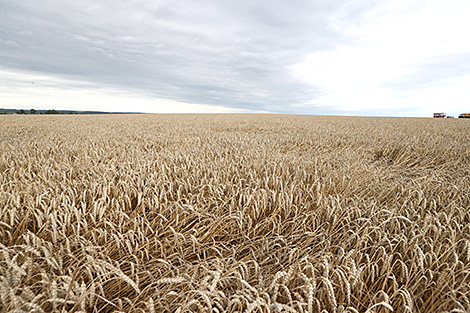
In Kamenets District Aleksandr Lukashenko examined wheat and rapeseed fields that had produced a good harvest using imported seeds. “The number one task is to make sure that we have them,” the president emphasized. Self-sufficiency in seeds is not only about import substitution. It is also a matter of food security.
It is also important to ensure the high quality of seeds, their compliance with high requirements “so that we do not have to persuade farmers to use domestic seeds. They should see the benefits of doing it themselves,” the head of state said.
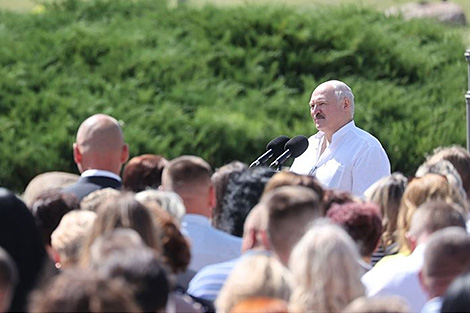
Aleksandr Lukashenko also touched upon this topic when talking to residents of the agrotown of Belovezhsky: “We have agreed that our science and plant breeders have to do some serious work. You plant a lot of foreign varieties. You buy seeds in Germany and so on. We need to have our own varieties. Probably it makes sense to buy 15% or maybe 20% abroad to compare and see the difference. We need to do it. But not more. This is why we will sort out science a bit and will improve things.”
Aleksandr Lukashenko was in Grodno Oblast a couple of days later and noted that a separate conversation at the presidential level would be arranged to discuss the matter. Aleksandr Lukashenko said: “It is necessary to work with scientists. It is necessary to give them a nudge. Once harvesting is over, it will be necessary to revisit this matter. We will gather up at my level and will look into it and think about it. It is necessary to give scientists a shake. That’s it. We have to look into it separately. They should get ready. Instead of simply saying what heroes they are they should identify what is bad.”
If everything was fine, Belarusian agricultural enterprises would not have to buy imported seeds. Moreover, they are more expensive than Belarusian ones. “This is why we need to sort out the seed material. And for all the crops at that,” he stressed.
Flax. And Vitebsk Oblast again
As he was receiving reports, the president paid close attention to flax yields and flax cultivation technology. Aleksandr Lukashenko was assured that the country’s linen mills would have the required amount of raw materials. However, Vitebsk Oblast will not be able to meet the target for long fiber unlike other regions.
The head of state called it a negative fact as Vitebsk Oblast had always been known as a flax-growing region. He suggested sowing flax on the president’s experimental field, doing everything according to the technology and evaluating the result.
“We need to finish pulling flax. We have a target and we need to meet it,” Aleksandr Lukashenko stressed.
“Human conditions” for cow calves
During a tour of a cattle farm in Berestovitsa District Aleksandr Lukashenko said he wanted the loss of cattle eradicated and mentioned that calves should be taken away from negligent farms and transferred to the farms where they will be given proper care.
Unfortunately, a high livestock mortality rate is still reported in a number of agricultural enterprises. “Livestock should not be lost. Only in exceptional cases. Livestock must be taken away [from negligent farms] until they fix their livestock management technology. Newly born calves should be treated as human babies. Why can’t we bring livestock here from negligent farms?! This enterprise would not refuse to take them in. We should take away baby calves from those farms that are unable to take good care of them. It must be done,” the head of state said.
He stressed that this issue should be promptly resolved. Aleksandr Lukashenko said he no longer intended to raise this topic with the leadership of the Agriculture and Food Ministry or with the oblast governors.
The head of state recalled his instruction to transfer dairy herd to modern dairy complexes within five years. The president urged to create good conditions for livestock maintenance and fattening.
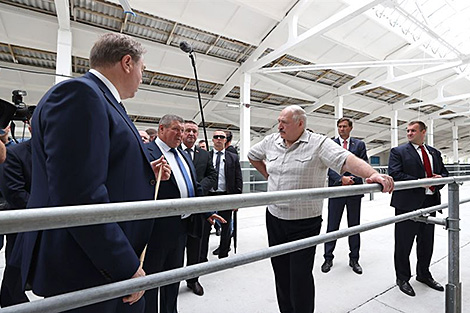
“It is not about adopting some uniform technological process, but rather about making up our mind on this matter,” he said.
Continuing the matter of reconstruction of dairy farms to convert them into modern dairy complexes, Aleksandr Lukashenko inspected new cow sheds and a milking and dairy unit in the agricultural enterprise Olekshitsy. These facilities were built within a year. The cost of the construction project was estimated at Br13.7 million. However, the actual cost is expected to drop to Br12.3 million.
“This is what needs to be done. An old farm. Set up a milking unit and two cow sheds. Use the rest to accommodate calves and other things,” the president said as he evaluated the work.
The technology for cattle keeping was also mentioned as Aleksandr Lukashenko visited the robotized dairy complex in OAO Belovezhsky.
The main matter the head of state had previously instructed to address is to determine the optimal variant in terms of functionality and cost. Without unnecessary cost-cutting or excessive spending. “Otherwise, we build palaces and don’t know how much they cost,” Aleksandr Lukashenko remarked.
The head of state once again reminded that everything needs to be well calculated, because at the moment the cost varies significantly from region to region. For example, as the president was recently informed, the construction of a dairy complex in Minsk Oblast costs Br10 million.
Bread on the table and harvesting in the field
During a trip to the agricultural enterprise Olekshitsy the head of state was made familiar with progress of the harvesting campaign in the region. In a winter wheat field near the Podbagoniki site local harvester drivers met with Aleksandr Lukashenko. Hot meals had just been delivered to them and the farmers invited the president to lunch with them.
Pea soup, mashed potatoes with patties, vegetables, bread and tea with a bun were on the menu.
“So how do they feed you? Okay? Okay,” Aleksandr Lukashenko spoke in positive terms about the first course.
After a snack the head of state talked to the rural residents to discuss the performance of grain harvesters made by Gomselmash. The workload per harvester in Grodno Oblast exceeds 300 hectares. It is one of the country’s highest. A total of 147 new harvesters of various modifications are supposed to be commissioned in the oblast this year.
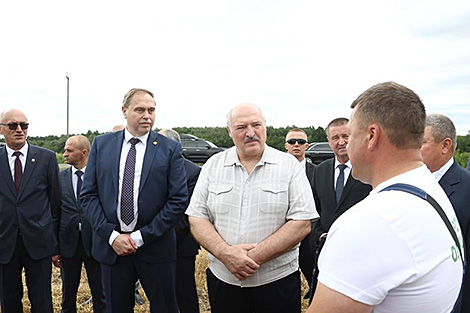
The comparatively new model GS2124 is also in use. It entered service last year and it is being tuned and polished now together with five crews sent by Gomselmash.
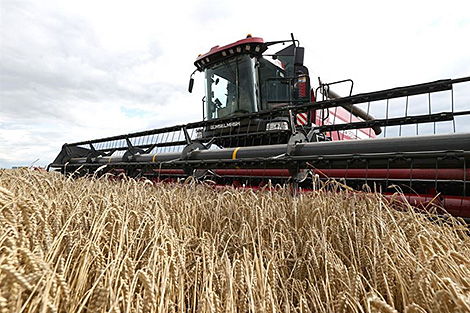
The local harvester drivers spoke positively about the vehicle. By the way, the model was created upon the president’s instruction in order to replace imports.
The head of state said he did not want old machines and vehicles dumped somewhere. “Don’t dump them. You have to give them to [Deputy Prime Minister Leonid] Zayats. He will move them to northern areas. You have to wisely treat the hardware,” Aleksandr Lukashenko stressed.
Returns from the countryside and the work of agrarians
While talking to residents of the agrotown of Belovezhsky in Kamenets District, most of whom work at the agricultural enterprise OAO Belovezhsky, Aleksandr Lukashenko thanked them for their work. “Now this is the country’s third biggest agricultural company in terms of area. It has more than 38,000 hectares of land. But about 20% of animal feed that you use to feed cattle has to be bought. You need to strive to become self-sufficient in animal feed. Of course, you have done a great job. I have noticed that I rarely praise people, but your performance is outstanding. Thank you very much for your work. Our peasants are strong people. I praise you not because I come from a peasant family myself. You are strong people and you are the pillar of the country. And even in those difficult times, none of you went astray. Everyone was in the field, growing food for everyone - both those who deserved to enjoy the results of peasant labor and those who roamed (mostly across Minsk) and waved their arms. Therefore, you are the foundation of our country,” Aleksandr Lukashenko stressed.
“And I don’t regret at all that back in the day we adopted programs to revive the countryside and invested substantial money in agriculture. Today we see appreciable results: last year we did not only feed our people, but also sold a decent amount of foodstuffs abroad,” the president added. “I often meet with the president of Russia, we discuss these issues, align our efforts. We had this gut feeling that these ‘friends’ from the West could create problems for us. Today both Russia and Belarus are self-sufficient in food. Our people have enough to eat and to wear. This is the main thing. There will never be stability in the country without this. And the clothes, shoes and food come from you, peasants. I wish we had such farms all over the country,” Aleksandr Lukashenko emphasized.
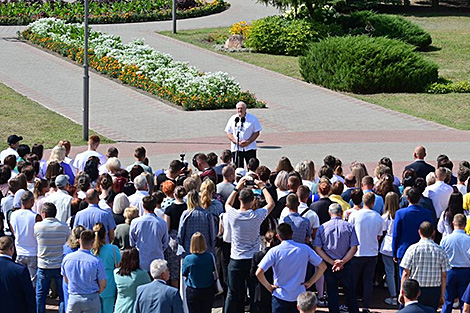
Speaking about the reasons for this working trip, Aleksandr Lukashenko said that he wanted to see how people work in the countryside in western Belarus. “They work well. They are doing a great job. Brest Oblast has reached a good level of performance. There is still room for improvement. The same is true for Grodno Oblast. Yet, the performance of Brest Oblast and Grodno Oblast is quite decent,” the head of state concluded.
Keep up the good work
The president noted that this year the drought has taken its toll on agriculture, especially in eastern and central regions of the country. “Some areas in eastern and central Belarus dried up so much that they were scary to look at. When I was driving [past the fields] to Minsk to work, I tried to look away,” the president said.
It has started raining since then but time is in short supply as far as agricultural work is concerned. “We haven’t finished harvesting and we have to proceed to grass fodder. And we need to start planting soon, literally any day now. Therefore, we can’t slow down in any case,” the Belarusian leader stressed.
Personnel management
During a working trip to Berestovitsa District, Grodno Oblast Aleksandr Lukashenko also raised the matter of personnel management, in particular, who should fill the vacant position of the agriculture and food minister.
During a conference call held previously to discuss the harvesting campaign Aleksandr Lukashenko gave instructions to promptly find a candidate for the vacant position of the agriculture and food minister since the previous minister Igor Brylo had been appointed the president’s aide, inspector for Vitebsk Oblast.
As a result of the dialogue between Aleksandr Lukashenko and Chairman of the Grodno Oblast Executive Committee Vladimir Karanik it became clear that First Deputy Chairman of the Grodno Oblast Executive Committee Yuri Valevaty had been one of the potential candidates.
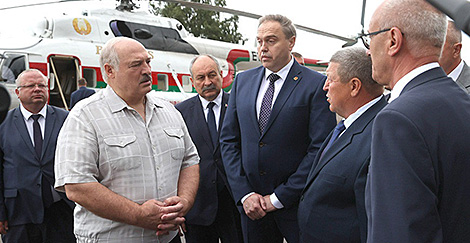
“Well, what don’t you like about the first deputy chairman for agriculture?” the president asked the Grodno Oblast governor.
Vladimir Karanik remarked that he is quite happy with his first deputy but everyone is a civil servant and Yuri Valevaty had been nominated for the agriculture minister’s office among other candidates.
The President’s Aide, Inspector for Grodno Oblast Yuri Karayev joined in the conversation. “In the Agriculture and Food Ministry the key is the commander of the front, not the chief of the General Staff. Because everything is decided at the local level. This is why, no offense, the first deputy governor has more leverage than the agriculture and food minister,” Yuri Karayev presented his point of view figuratively and militarily.
The president agreed: “The Agriculture and Food Ministry should mind its own business after all. It should take care of some new breakthrough avenues and technologies.”
The ministry should also take care of the overall strategy. “And the rest is here [at the local level],” the Belarusian leader stressed.
PROBLEM No.1. What does Belarus lack most?
While talking to residents of the agrotown of Belovezhsky, Aleksandr Lukashenko spoke not only about agriculture but also about the country’s social and economic development. He touched upon important matters that worry everyone and gave detailed answers to questions asked by the rural dwellers.
The president believes that at present demographic problems are more pressing for Belarus than economic ones.
“We have a good foundation. We have something to base our future accomplishments on. We will feed people. We will have enough food to eat and enough clothes and shoes to wear. And our children will go to school normally. It is of current interest now. I don’t think you have any problems with this, but we need to make sure that children receive everything that the state wants to offer to them,” Aleksandr Lukashenko noted.
“The biggest problem now has to do with population numbers, not economy (though economy is the cornerstone of everything). We need a much bigger population,” he said.
The president emphasized that the government will always support families raising many children. Aleksandr Lukashenko noted that other countries do not offer so many benefits as Belarus does. “To be honest, when I start analyzing, I sometimes think that we may not be able to sustain such support at some point. But it is important for people to understand that they should share responsibility for raising their children,” the head of state said.
SECURITY FACTOR. What doesn’t Aleksandr Lukashenko want for his people?
Belarus has no intention of attacking anyone and the president wants the country to live only a peaceful life. But it is necessary to be able to defend the state and the nation if need be.
“Times are complicated. We are peaceful people, we’ve had enough wars in our history. As a historian, I know this well. I know that there were a lot of bloody battles. Not only Brest Fortress fought to the bitter end. Lots of people suffered in that terrible war, the witnesses of which are still alive. Every family had losses. Therefore, I do not want my people, especially while I am the president, to go to war. You see what is happening in the neighboring country. They are our cousins, our kin. We have a lot of relatives there. It is a terrifying thing. We draw conclusions, learn very serious lessons. But I want you to understand that we are not rattling our sabers but are preparing to defend our country at any moment,” the head of state said.
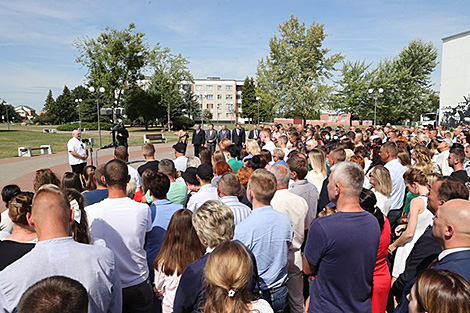
The president noted that Belarus is counting on the support of fraternal Russia in this matter. “Without help, it will be difficult. But who will help us? Only our brothers in the east - Russians,” Aleksandr Lukashenko said.
The head of state noted that the Russian leadership had responded even to the biggest requests from Belarus. Such as the deployment of tactical nuclear weapons in the country. They are a security factor alongside the nuclear power plant, the president noted. “A nuclear country has never been attacked before,” he explained. “We have a nuclear power plant. This, I must tell you, is a very strong security factor: if it explodes, God forbid, all will be affected. Therefore, you have to be very careful with it. We see what is happening with the nuclear reactors in Ukraine.”
According to Aleksandr Lukashenko, more than half of the nuclear weapons that were planned to be deployed in Belarus have already been brought and dispersed across the country. “God forbid we have to use these weapons. I still hope that this will not happen,” the president added. “We don’t mess with anyone. Please don’t mess with us either. We will ensure our security with the help of our friends.”
“Our western neighbors are going crazy. I just don’t know why they are acting the way they do. We had lived peacefully, calmly. Nobody had been stressing out anyone. Then crazy people came to power, I can’t call them otherwise, and things went off the rails. We do not interfere in their affairs. We want to have normal relations. Belarusians, Poles, Lithuanians have always lived together. And now they are normal. We do not close the border to them. We welcome them to come over, buy stuff they need from us,” the head of state said.
PMC Wagner, a contract army, and the Suwalki Corridor
During the meeting with local residents Aleksandr Lukashenko noted that more efforts will be poured into creating a contract army in Belarus. The president remarked that some units of the private military company (PMC) Wagner had joined the Russian regular army, some are working in Africa, and some are staying in Belarus. The president said: “It was my initiative and I don’t regret it. I want to leave these guys in the armed forces of our country. And relying on them, I’d like to more actively create a contract army. Our active service draftees serve for 1.5 years and leave. I was one of them. Green kids 18 years old. But over there we have experienced people. They are mainly officers. It is their profession to fight or defend the country. They say it is even cheaper. This is why we are looking attentively at this experience in order to protect us in the future. It is our only goal.”
The president went on saying: “This is why don’t worry. We don’t want a war and I think that everything will be normal. If the enemy sees that we will respond in kind and they will incur irreparable losses, losses that will not be acceptable for them, they will never attack us.”
Not only the military but all citizens of the country can make a contribution to the country’s security. “Everyone has a job to do (someone is an accountant, someone is an economist, an executive, a machine operator, a milking machine operator). Everyone should do their job in their own positions,” Aleksandr Lukashenko shared his recipe of a calm and peaceful life.
Speaking about the private military company (PMC) Wagner, Aleksandr Lukashenko recalled the recent history of the matter when he had to interfere in events in Russia. He said he wanted to keep this unit. “They are genuine fighters, who have been to war and who have lost many friends. They help us totally for free and pass on their experience. Although they are mercenaries. They have fought and worked everywhere in exchange for money,” the president said. “I need to train my own military personnel because an army that doesn’t fight is half an army. You also understand it perfectly well. I don’t want to fight. I don’t want our guys to die. This is why they need to be trained. So they are here to pass on their experience. They are very satisfied with our warriors. They say that they are very well-trained people and, most importantly, they want to learn. This is why these guys want to go nowhere. They stay near Osipovichi in the center of Belarus. They are accustomed to taking orders.”
In response to concerns of some Western politicians, the president stressed that Belarus absolutely doesn’t need the Suwalki Corridor. The corridor is a land route that goes along the borders of Poland and Lithuania and could connect Belarus with Russia’s Kaliningrad Oblast. At the same time Aleksandr Lukashenko noted that Belarus will move its military units in its own territory any way it wants. “We build defenses according to a plan and bearing in mind even the experience of these Wagner fighters,” he added.
During a recent meeting with President of Russia Vladimir Putin Aleksandr Lukashenko mentioned the desire of PMC Wagner fighters to “go sightseeing” to Warsaw and Rzeszow: “I made a joke that Wagner fighters are gossiping about going sightseeing to Rzeszow. Why? Because weapons and materiel came from Rzeszow to where these Wagner fighters were fighting near Artyomovsk (Bakhmut). Thousands of their guys died there. And they are in no mood to forgive it. They [Polish authorities] should thank Belarusians and me for inviting these fighters to Belarus. There are thousands of them. I don’t even want to specify. They have a total of over 30,000 people under control now. These guys are willing to fight. They hurt. Many have been maimed and killed. Will they forgive? They won’t. This is why they should pray that we keep them and supply somehow. Otherwise they could have infiltrated Poland and could have delivered a terrible punch to Rzeszow and Warsaw. This is why they shouldn’t reproach me. They should thank me.”
The international scuffle Belarus has become involved in
While talking to the head of state, residents of the agrotown admitted that they are concerned about actions of Polish authorities at the Belarusian border and the redeployment of Polish troops and weapons closer to the border.
Aleksandr Lukashenko remarked that Belarus closely watches this maneuvering: “I don’t think they are trying to intimidate us. I don’t think that they are afraid of us. I don’t think that they are doing it due to changes of the situation. After all, they can see that we are not mobilizing the army. We don’t redeploy troops here like it happened in 2020.”
The president went on saying: “Why is it happening now? There are many reasons. We got into a decent international scuffle. The entire Europe. Americans have been destroying Europe since Trump’s time. They need to bet on someone. They are thousands of kilometers away after all. Do you remember the UK’s withdrawal from the European Union? What didn’t the UK like? Everything was normal. But the UK and the USA are bosom buddies. Their relations are even closer than ours with the Russian Federation. This is why the UK is their mainstay, their unsinkable aircraft carrier. On the other side there is Poland. They bet on Poland. They were supposed to bet on us and Ukraine. If we hadn’t persevered in 2020, we would have been dropped into a pile to form a belt from the Baltic Sea to the Black Sea. Poland, Belarus, and Ukraine as a sanitary cordon between Russia and China in the east. We endured. So, they are betting on Poland now. Poland will still make problems for us. Not Poles. They are smart people. We saw how migrants crossed the border over there, what military personnel did. They didn’t understand why they had been sent there. But their leaders have gone crazy. Americans will bet on them. They will pump them.”
Aleksandr Lukashenko noted that American leaders visit Warsaw more frequently than capital cities of Old Europe, which happens to be in a tight corner. According to the president, Europe is no enemy for the USA but a strong competitor. “Those are high-tech, strong, and rich countries. So, they are now undressing Europe: give money. If you recall, since Trump’s time they wanted Europe to spend 2% of the GDP on weapons. Europe is in a tight corner. They have yet to sort out Europe. They have already humiliated Europe as much as they could. Look: Germany was the world’s fourth largest economy and is now in the 10-11th position. Virtually within two years.”
The president stated that the USA needs a humiliated and crushed Europe, a ruined Russia, and an unhindered access to China.
“This is why the redeployment of these troops is a hoax. They redeploy 500 people here and 500 people there. Intimidation and pressure buildup are in progress. Although I don’t believe that they are trying to intimidate us. I promise you that it is impossible to intimidate us,” Aleksandr Lukashenko summed it up.
POLE’S CARD. Who got their wings clipped in Belarus and what’s coming next?
One of the residents of the agrotown noted that a law on citizenship that recently came into force in Belarus obliges citizens to report if they have foreign citizenship. There are norms that give grounds for revoking Belarusian citizenship. “What about the Pole’s Card? Maybe it should be outlawed altogether and its holders have their rights restricted?" she asked the head of state.
Aleksandr Lukashenko explained: “The state can revoke the citizenship of those people who are enemies, those who live here or abroad and work against our country. We had our share of this in the past. That’s what the problem is about. We have not yet deprived anyone of citizenship. But they must understand that if they see us as their enemies and are fighting against our country, calling for sanctions (like opposition supporters do), then they will face retaliation. This is what this is about.”
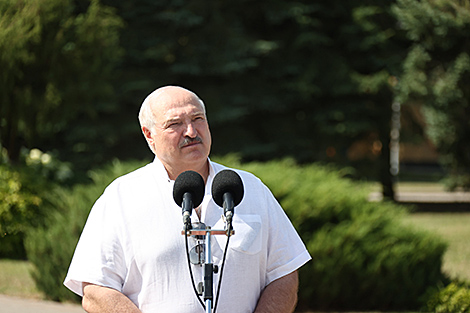
“As for the Pole's Card holders, well, we have clipped their wings by a lot. I feel that this problem is still here. We will revisit it,” the Belarusian leader said.
Aleksandr Lukashenko instructed the Belarus President Administration to look into this issue and suggest measures. “I don’t want to offend people either. For example I have many acquaintances in Grodno. Some of them hold public offices. But they have the Pole’s Card too. I asked them, ‘Guys, how come?’ ‘Aleksandr Grigoryevich [Lukashenko], don’t worry. If necessary, we’ll throw it away tomorrow.’ Well, they say, everybody took this card. So did they. After all, it did offer some advantages. Everyone received it, they say, so did they. I don’t want to undercut these people. Therefore, we are making careful steps,” the head of state explained.
“We cannot stress people too much. People should live freely on their land, in their society. They need to be able to express their position and need not be afraid of anyone. Otherwise, why do we need such a state where people get oppressed? Therefore, it is very important not to go too far. I didn’t coin the phrase. It is a popular saying. But we will think about them,” Aleksandr Lukashenko added.
TIME OF THE BRAVE. What did Lukashenko describe as a sign of weakness of world establishment and what does sport have to do with it?
Attention of millions of sport fans across the globe is once again riveted to Belarus. The head of state stressed this fact during the solemn opening ceremony of the 2nd CIS Games on 5 August.
The long-awaited sport forum, which gathered not only athletes from the Commonwealth of Independent States but athletes from many other friendly countries of the so-called remote arc in Belarus, opened with a picturesque show in Minsk Arena. Neither distances nor sanctions of the collective West nor infrequent bias of international sport officials impeded Belarus in once again organizing a celebration for fans not only in Minsk but also in a number of other Belarusian cities.
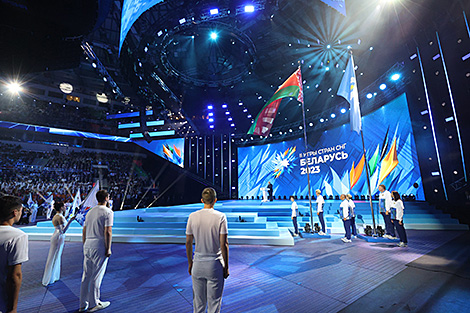
Sport is truly international. The title of the world’s best or the continent’s best or an Olympic champion can be contested only in a competition with the best. If this condition is not met, then the victory will be hollow. Athletes understand it perfectly well but some figures in the West totally refuse to understand it. They call for sanctions against Belarusian and Russian athletes and thus deprive their athletes of the right to a decent victory.
The fire that still burns
In his speech Aleksandr Lukashenko recalled that Belarus hosted the 2nd European Games four years ago and that fire still burns.
He stressed: “It burns with faith in Olympic ideals, true justice and sport brotherhood. It unites true friends, loyal and reliable ones, people with iron character. It has brought us together.”
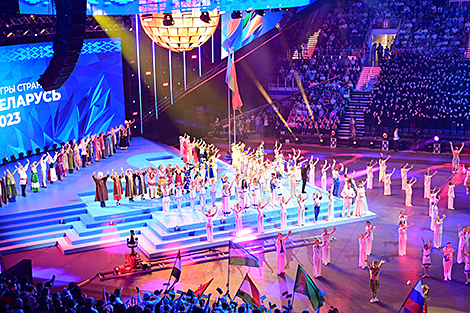
The head of state expressed gratitude to the member countries of the Commonwealth of Independent States, all the countries that had sent their delegations to the Games: “You have shown your trust in Belarus, and we will deliver top-quality Games. They have a great future.”
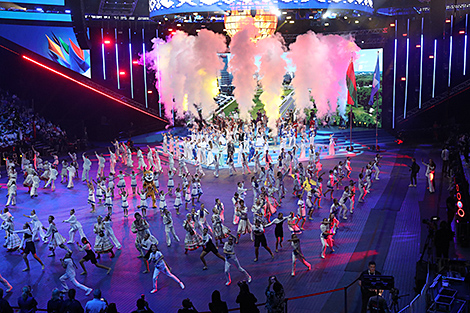
Sanctions and their crazy initiators
The president said: “This tournament has a great future. This future is in our hands. No matter how hard the world establishment, embittered and powerless, tries to take it away. I am convinced that they also see us now.”
He suggested that these people watch, listen and draw conclusions. “You’re trying to remove strong competitors from international sport. You want to take away our sport victories. You are killing the spirit and purpose of the Olympic movement. This is a sign of weakness and your fear. This is an attempt to hide behind the iron curtain from the truth of life. This is recognition of the strength of our deepest values, which are shared by the overwhelming majority of people on the planet, including ordinary Europeans and Americans,” Aleksandr Lukashenko said.
He remarked that thousands had turned up in Minsk Arena alone for the opening ceremony while millions all over the world watched the broadcast.
During the competition days participants of the Games, guests, and all TV viewers will see not only beautiful Belarus but also the culture of those 20 countries that are represented by leading athletes. “You will see the traditions, the heroic history of Belarus which is shared by all countries of the Commonwealth. You will see that Belarus has a magnificent enchanting nature. Everyone will see modern arenas, strong athletes, exciting competitions and new records, and most importantly - a great international interest in these Games. More than 2,000 athletes from more than 20 countries of different continents have gathered here. No sanctions, no political intrigues will deprive us of this fest. It’s impossible. The world is small, interdependent, interconnected. Only madmen are trying to break these ties,” the Belarusian leader stressed.
A symbol of friendship, peace and creation
Aleksandr Lukashenko is convinced that guests of the Games will feel warm, cozy and, most importantly, calm in Belarus. “Mentally calm on the Belarusian land. We have done and will do everything for this. We will do our best for the CIS Games to become a true symbol of friendship, peace and development,” he remarked.
The president reminded that the slogan of the Games is Strong in Spirit, Strong in Competition! “It is not just about sport. It is about every one of us. The time of courageous and resolute people has come. People able to stand up for the honor of the country, for the victories of their fathers and the future of their children. This is our time!” the head of state said.
Aleksandr Lukashenko wished all athletes participating in the Games good luck and great personal achievements: “I want to ask you, athletes, not to worry! It is impossible to take us, Russians, Belarusians, and others, out of the international Olympic and sports movement. You will always be in demand. You will always be in business.”
The president wished wisdom and patience to coaches and a great show, unforgettable impressions and plenty of positive emotions to fans.


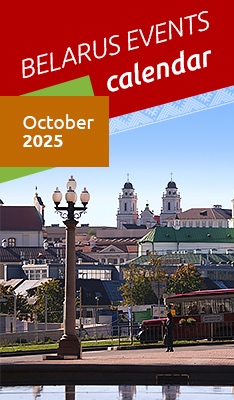




 print version
print version make home page
make home page add to bookmarks
add to bookmarks

